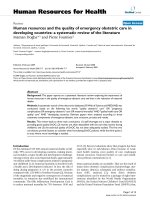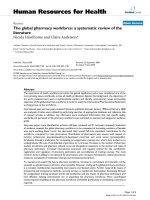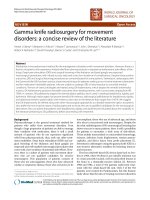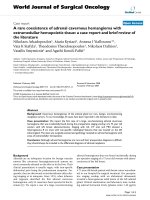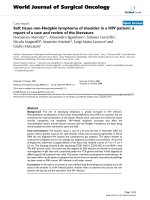Bone and soft tissue sarcomas during pregnancy: A narrative review of the literature
Bạn đang xem bản rút gọn của tài liệu. Xem và tải ngay bản đầy đủ của tài liệu tại đây (645.02 KB, 7 trang )
Journal of Advanced Research (2016) 7, 581–587
Cairo University
Journal of Advanced Research
REVIEW
Bone and soft tissue sarcomas during pregnancy: A
narrative review of the literature
George Zarkavelis a, Dimitrios Petrakis a, George Fotopoulos b, Sotirios Mitrou c,
Nicholas Pavlidis a,*
a
Department of Medical Oncology, Ioannina University Hospital, 45110 Ioannina, Greece
Department of Medicine, Sotiria General Hospital, Athens University, Athens, Greece
c
REA Maternity Hospital, A. Sygrou Avenue, 383, P. Faliro, Athens, Greece
b
G R A P H I C A L A B S T R A C T
A R T I C L E
I N F O
Article history:
Received 1 October 2015
Received in revised form 12 January
2016
A B S T R A C T
Bone or soft tissue sarcomas are rarely diagnosed during pregnancy. Until today 137 well documented cases have been reported in the English literature between 1963 and 2014. Thirty-eight
pregnant mothers were diagnosed with osteosarcoma, Ewing’s sarcoma or chondrosarcoma,
* Corresponding author. Tel./fax: +30 26510 99394.
E-mail address: (N. Pavlidis).
Peer review under responsibility of Cairo University.
Production and hosting by Elsevier
/>2090-1232 Ó 2016 Production and hosting by Elsevier B.V. on behalf of Cairo University.
This is an open access article under the CC BY-NC-ND license ( />
582
G. Zarkavelis et al.
Accepted 13 January 2016
Available online 2 February 2016
Keywords:
Cancer
Pregnancy
Bone sarcomas
Soft tissue sarcomas
whereas 95 other cases of soft tissue sarcomas of various types have been documented. We present the clinical picture and therapeutic management of this coexistence.
Ó 2016 Production and hosting by Elsevier B.V. on behalf of Cairo University. This is an open
access article under the CC BY-NC-ND license ( />4.0/).
Nicholas Pavlidis, MD, PhD, FRCP Edin, is a
Professor and Head of the Department of
Medical Oncology, Ioannina University
Hospital, Greece, and Member of Scientific
Committee and Coordinator of Master classes
of European School of Oncology; Member of
Scientific Committee of ESMO/ASCO Global
Curriculum; and Editor in Chief, Cancer
Treatment Reviews.
George Zarkavelis, MD, is a fellow in Medical
Oncology, Department of Medical Oncology,
Ioannina University Hospital, Greece.
Introduction
Dimitrios Petrakis, MD, PhD, works as a
Senior Oncologist, Department of Medical
Oncology, Ioannina University Hospital,
Greece
George Fotopoulos, MD, works as a Senior
Oncologist, Department of Medicine, Sotiria
Hospital, University of Athens, Greece.
Sotirios Mitrou, MD, works as a Senior
obstetrician and gynecologist, REA Maternal
Hospital, Athens, Greece
Cancer and pregnancy
Cancer diagnosis during pregnancy is a rare coexistence in a
ratio of one case per 1000 deliveries. However, there is an
increasing trend due to delaying pregnancy in western societies
into the later reproductive years [1].
The most common gestational cancers are those appearing
during the reproductive period of a woman. Breast cancer and
cervical cancers are the most frequently diagnosed malignancies followed by hematological tumors and melanoma [1].
Diagnostic and staging workup should be very carefully
performed due to maternal and fetal radiation exposure. Recommendation of imaging studies should always follow the
established guidelines [2].
Systemic chemotherapy should be avoided during the first
trimester of pregnancy due to lethal, teratogenic or developmental malformation effects. However, during the second
and third trimesters certain chemotherapeutic drugs can be
administered. Hormonal and/or targeted treatments should
not be advised. In addition, radiotherapy cannot be applied
to the mother’s trunk due to the lethal effects on the fetus [3,4].
Metastatic transmission to the products of conception happens rarely and the most frequent malignancies that invade
placenta and fetus are melanoma (30%), cancer of unknown
primary site (22.5%), hematological malignancies (15%),
breast cancer (14%) and lung cancer (13%) [5].
Bone and soft tissue sarcomas [6]
Malignant bone tumors are rare, accounting for only 0.2% of
all malignancies. Among them the most frequent are osteosarcoma, Ewing’s sarcoma and chondrosarcoma. Less frequent
sarcomas are the malignant fibrous histiocytoma, chordoma,
and very rarely liposarcoma, angiosarcoma, and
hemangiopericytoma.
Bone and soft tissue sarcomas during pregnancy
583
It is the commonest primary bone tumor and occurs predominantly in adolescence with a peak incidence at the age of 15–
19 years. Osteosarcoma most commonly involves long bones
(mainly the tibia close to knee joint) and more rarely the axial
skeleton. It presents with localized bone pain characteristically
during the night or at rest. Limb-sparing surgery with extending endoprostheses is the treatment of choice. Adjuvant
chemotherapy improves overall survival. In certain cases
neoadjuvant chemotherapy can be used.
Cajal. The annual incidence in UK ranges from 1.32 to 1.50
per 100,000 population which is equivalent to 800–900 new
cases per year. The stomach (60%) and small intestine (30%)
are the most common primary sites followed by duodenum
(5%) and colorectum (5%). The most common symptoms
are vague, nonspecific abdominal pain and discomfort. Rarely
GI obstruction or bleeding could be seen.
Surgery is the primary treatment, whereas targeted therapy
with tyrosine kinase inhibitors (imatinib, sunitinib or regorafenib) produced excellent results in both adjuvant and metastatic settings.
Ewing’s sarcoma
Synovial sarcoma
It is part of the Ewing’s sarcoma family including also the
primitive neuroendocrine tumor and Askin’s tumor. The median age is 14 years and tumor affects long bones or axial skeleton. Presenting symptoms are local pain, (deteriorating at
night) as well as fever or weight loss. Systemic chemotherapy
(neoadjuvant or adjuvant) is usually followed by local radiotherapy. In certain cases, surgery can be recommended following induction chemotherapy.
It can occur at any age but it is more common among teenagers and young adults. Most commonly it is located in the
legs or arms. It is usually diagnosed as a slowly growing painless mass. Surgery followed by radiotherapy is the recommended treatment. Chemotherapy is advised in patients with
metastatic disease.
Bone osteosarcoma
Chondrosarcoma
It is more commonly diagnosed over the age of 40. Most frequently it affects the pelvis, axial skeleton and proximal limbs.
Histologic grading is important ranging from grade 1 to 3. The
primary modality of therapy is surgery. Five-year survival is
>90% and 25% for grade 1 and 3, respectively.
Soft tissue sarcomas
Leiomyosarcoma
The most common site of leiomyosarcomas is the retroperitoneum (50%), followed by abdominal viscera, uterus or
extremities. Retroperitoneal leiomyosarcomas usually present
with vague abdominal discomfort, abdominal mass or weight
loss, while peripherally located primaries present with a painless enlarging mass. Surgery remains the dominant treatment.
Chemotherapy has poor results in metastatic disease.
Kaposi’s sarcoma
Is a sarcoma caused by human herpesvirus 8. It is classified
into four different forms: the classic, the endemic, the immunosuppression – associated and AIDS-associated Kaposi sarcomas. It involves the skin, mouth, GI tract and respiratory
tract. In general, surgery is not recommended.
Angiosarcoma
It most commonly occurs in the skin, breast, liver, spleen and
deep tissue. It can present as a skin lesion or a painless soft
lump. Surgery is the primary therapeutic choice.
Endometrial stromal sarcoma (EDS)
It affects adults between 40 and 60. It involves most commonly
the thigh followed by abdominal cavity. Histologically, there
are four types: well-differentiated, myxoid, pleomorphic and
dedifferentiated liposarcoma. Prognosis is dependent on histologic type and site of disease.
EDSs are very rare malignant tumors that make up approximately 10% of uterine sarcomas but only around 0.2% of all
uterine sarcomas. They can present by abnormal bleeding or
spotting, vaginal discharge, pelvic pain or mass. Histologically,
EDSs are divided into the following: (a) endometrial stromal
nodule, (b) low-grade endometrial stromal sarcoma and (c)
undifferentiated stromal sarcoma. Surgery with adjuvant
radiotherapy is the recommended treatment. Five-year survival for early stage I is 54–100%, for stage II (30%) and for
stage III–IV only 11%.
Rhabdomyosarcoma
Literature search
Liposarcoma
They arise from skeletal muscle cells. The most common locations are in the head and neck (40%), the genitourinary tract
(25%) and the extremities (20%). The symptoms are associated with the tumor location. There are two main histologic
types: the embryonic and the alveolar type.
GIST (Gastrointestinal stromal tumors)
GISTs are soft tissue mesenchymal tumors occurring in the
gastrointestinal tract, originating in the interstitial cells of
Bone sarcomas (Table 1)
Osteosarcoma
In total 24 cases of various subtypes of gestational osteosarcomas have been reported since 1977. Osteoblastic, fibroblastic,
chondroblastic, paraostal or high-grade osteosarcomas have
been documented. The most common primary bone sites were
thigh, pelvis and back, whereas the most frequent presenting
symptoms were pain, detection of a mass or pathological fracture. Most patients were treated surgically either during
584
G. Zarkavelis et al.
Table 1
Bone sarcomas during pregnancy.
Histology
No of cases
% (all sarcomas)a
Period
Osteosarcoma [7–12]
Ewing’s sarcoma [10,13–18]
Chondrosarcoma [9,10,19,20]
24
19
10
17
14
7
1977–2012
1963–2012
1989–2015
a
Out of a total of 137 sarcomas reported.
Table 2
Soft tissue sarcomas during pregnancy.
Histology
No of cases
% (all sarcomas)a
Period
Leiomyosarcoma [9,21–34]
Liposarcoma [10,29,35–43]
Rhabdomyosarcoma [10,44–56]
GIST (57–65)b
Synovial sarcoma [29,66–72]
Kaposi’s sarcoma [73–80]
Angiosarcoma [9,81–83]
Endometrial stromal sarcoma [84–88]
17
17
14
9
9
8
5
5
12
12
10
7
7
6
4
4
1969–2010
1993–2014
1969–2014
1996–2014
2007–2014
1971–2012
2004–2013
2002–2014
a
b
Out of a total of 137 sarcomas reported.
Gastrointestinal stromal tumors.
pregnancy or postpartum and some patients received
chemotherapy in an adjuvant setting during the postpartum
period. Survival outcomes are similar to their nonpregnant
counterparts [7–12].
Ewing’s sarcoma
Since 1963 19 cases of gestational Ewing’s sarcomas have been
published in the English literature, including three cases of
extra-skeletal Ewing’s sarcoma. Almost all cases were diagnosed during pregnancy. Most cases were treated during pregnancy with chemotherapy, radiotherapy to the extremity and/
or surgery and resulted in a favorable outcome for both
mother and newborn. Only two patients underwent termination of pregnancy [10,13–18].
Chondrosarcoma
Only 10 cases of gestational chondrosarcomas appeared in the
literature during the last 25 years. Primary tumors were
located on iliac, innominate, tibial head and maxillary bones.
One case was diagnosed as extraskeletal myxoid chondrosarcoma. Surgical intervention during pregnancy is not always
feasible [9,10,19,20].
Soft tissue sarcomas (Table 2)
Leiomyosarcoma
Gestational leiomyosarcoma constitutes 12% of all sarcomas
diagnosed during pregnancy. Since 1969, 17 cases have
appeared in the literature. Among the reported cases most of
them arise in the uterus followed by vulva, jejunum and
retroperitoneal area. Histopathologically, typical leiomyosarcomas (mostly high grade), or epithelioid or myxoid type
was diagnosed. Uterine leiomyosarcomas are generally considered to be more aggressive than other types of uterine tumors
[9,21–34].
Liposarcoma
During the last two decades 17 cases of liposarcomas during
pregnancy (12%) have been published. Almost all of them
were located in the retroperitoneal area mostly with myxoid
histology. Surgical manipulation is not feasible in all patients.
About 50% of patients died early after diagnosis, while newborns remained well and healthy wherever deliveries were
achievable [10,29,35–43].
Rhabdomyosarcoma
Fourteen cases of gestational rhabdomyosarcoma (10%) have
been described during the last 45 years. Most common primary
sites were orbit or vagina followed by maxillary sinus, nasal
septum, perineum, bladder, breast or retroperitoneum. Apart
from typical rhabdomyosarcomas some patients were diagnosed with embryonal, botryoid, spindle-cell or alveolar subtype of rhabdomyosarcomas. In one case invasion of the
placenta was found [10,44–56].
Gastrointestinal stromal sarcoma (GIST)
Since the term of GIST was given in 1983, 9 pregnant mothers
with gestational GIST have been documented. Signs and
symptoms are usually non-specific unless they occur as a result
of the ‘‘mass effect” of the tumor itself. CT scans are not recommended, however they can be replaced by abdominal ultrasound or even MRI. The optimal timing of surgery it is not
well defined leaving the decision to the multidisciplinary team
setting although it is considered safe in pregnancy. Imatinib
treatment during pregnancy or breast feeding is contraindicated since spontaneous miscarriages and birth defects
have been reported. Prognosis of women with gestational
GIST remains favorable [57–65].
Synovial sarcomas
Gestational synovial sarcomas are rare sarcomas. Since 2007
only 9 cases (7%) of synovial sarcomas during pregnancy were
Bone and soft tissue sarcomas during pregnancy
found. Three were primary pulmonary sarcomas, two head
and neck sarcomas, one leg, one pelvis, one abdominal wall
and one renal synovial sarcoma. Signs and symptoms included
local slowly growing swelling for superficial tumors or symptoms related to the primary sites i.e. dyspnea, hematuria. Most
women died of advanced disease [29,66–72].
Kaposi’s sarcoma
Eight cases (6%) of Kaposi’s sarcomas were found in the literature during the last 40 years. Five cases were diagnosed as
AIDS-associated Kaposi’s sarcomas following maternal infection with human immunodeficiency virus [73–80].
Angiosarcoma
Only 5 gestational angiosarcomas were reported in the English
literature. Two were located to the breast and one to the skull.
No data are available for the other two patients [9,81–83].
Endometrial stromal sarcoma
Five cases (4%) have been reported between 2002 and 2014.
Most of them represent low-grade stromal sarcomas [85–89].
Conclusions
In conclusion, diagnosis of bone and soft-tissue sarcomas in
young pregnant women is rare. However, almost all types of
sarcomas have been reported to coexist with pregnancy. In
localized disease the goal is to treat primarily the mother
and simultaneously to try to protect and safe the life of the
fetus depending on the period of gestation. In metastatic disease the prognosis of the mothers is still poor in majority of
the cases.
Conflict of Interest
The authors have declared no conflict of interest.
Compliance with Ethics Requirements
This article does not contain any studies with human or animal
subjects.
References
[1] Pentheroudakis G, Pavlidis N. Cancer and pregnancy:
poena magna, not anymore. Eur J Cancer 2006;42(2):126–40.
[2] Orecchia R, Lucignani G, Tosi G. Prenatal irradiation and
pregnancy: the effects of diagnostic imaging and radiation
therapy. Recent Results Cancer Res 2008;178:3–20.
[3] Azim Jr HA, Pavlidis N, Peccatori FA. Treatment of the
pregnant mother with cancer: a systematic review on the use of
cytotoxic, endocrine, targeted agents and immunotherapy
during pregnancy. Part II: hematological tumors. Cancer Treat
Rev 2010;36(2):110–21.
[4] Azim Jr HA, Peccatori FA, Pavlidis N. Treatment of the
pregnant mother with cancer: a systematic review on the use of
cytotoxic, endocrine, targeted agents and immunotherapy
during pregnancy. Part I: solid tumors. Cancer Treat Rev
2010;36(2):101–9.
585
[5] Pavlidis N, Pentheroudakis G. Metastatic involvement of
placenta and foetus in pregnant women with cancer. Recent
Results Cancer Res 2008;178:183–94.
[6] Ajithkumar T. Oxford desk reference oncology. Oxford:
University Press; 2011, p. 406-432.
[7] Pratt CB, Rivera G, Shanks E. Osteosarcoma during pregnancy.
Obstet Gynecol 1977;50(1 Suppl):24s–6s.
[8] Merimsky O, Inbar M, Issakov J, Kollender Y, Flusser G,
Meller I, et al. Gestation-related malignant musculoskeletal
tumors. Isr Med Assoc J 2003;5(4):264–7.
[9] Maxwell C, Barzilay B, Shah V, Wunder JS, Bell R, Farine D.
Maternal and neonatal outcomes in pregnancies complicated by
bone and soft-tissue tumors. Obstet Gynecol 2004;104(2):344–8.
[10] Al-Jubran A, Salam MA, El-Weshi A, Memon M, Ezzat A,
Maghfoor I. Bone and soft tissue sarcomas during pregnancy. J
Clin Oncol 2005 ASCO, Annual Meet Proceed 2005;23(16S
(June 1 Suppl)):9077.
[11] Kanazawa I, Yamauchi M, Yano S, Imanishi Y, Kitazawa R,
Nariai Y, et al. Osteosarcoma in a pregnant patient with
McCune-Albright syndrome. Bone 2009;45(3):603–8.
[12] Correˆa RR, Espindula AP, Machado JR, Paschoini MC,
Pacheco Olega´rio JG, Rocha LP, et al. Osteosarcoma in a
pregnant woman: case report. Arch Gynecol Obstet 2012;286
(6):1601–2.
[13] Lysyj A, Bergquist JR. Pregnancy complicated by sarcoma.
Report of two cases. Obstet Gynecol 1963;21:506–9.
[14] Verheecke M, Salembier C, Vanderlinden S. Delayed diagnosis
of an Ewing sarcoma of the knee during pregnancy. Facts Views
Vis Obgyn 2013;5(2):133–8.
[15] Chihara IG, Osada H, Iitsuka Y, Masuda K, Sekiya S.
Pregnancy after limb-sparing hemipelvectomy for Ewing’s
sarcoma. A case report and review of the literature. Gynecol
Obstet Invest 2003;56(4):218–20.
[16] Merimsky O, Le Chevalier T, Missenard G, Lepechoux C,
Cojean-Zelek I, Mesurolle B, et al. Management of cancer in
pregnancy: a case of Ewing’s sarcoma of the pelvis in the third
trimester. Ann Oncol 1999;10(3):345–50.
[17] Nakajima W, Ishida A, Takahashi M, Hirayama M, Washino
N, Ogawa M, et al. Good outcome for infant of mother treated
with chemotherapy for Ewing sarcoma at 25–30 weeks’
gestation. J Pediatr Hematol Oncol 2004;26(5):308–11.
[18] Schur S, Wild J, Amann G, Ko¨stler W, Langer M, Brodowicz T.
Sarcoma of the Ewing family in pregnancy: a case report of
intrauterine fetal death after induction of chemotherapy. Case
Rep Oncol 2012;5(3):633–8.
[19] Heetkamp A, Feijen HW, Papatsonis DN. Spontaneous delivery
after hemipelvectomy because of chondrosarcoma: a case report
and review of the literature. Am J Perinatol 2008;25(4):255–8.
[20] Roessler PP, Schmitt J, Fuchs-Winkelmann S, Efe T.
Chondrosarcoma of the tibial head during pregnancy: a
challenging diagnosis. BMJ Case Rep 2014;2014:30.
[21] Soto RE, Carvajal FC, Lopez VS. Ginecol Obstet Mex 1970;27
(164):693–9.
[22] Wolfe SA, Seckinger D. Sarcoma of the uterus associated with
pregnancy. Am J Obstet Gynecol 1969;104(8):1215–6.
[23] Calzada GJ. Leiomyosarcoma and pregnancy (report of a case).
Ginecol Obstet Mex 1974;35(209):247–9.
[24] King TM, Atienza MF, Burkman RT. The incidence of
abdominal surgical procedures in a population undergoing
abortion. Am J Obstet Gynecol 1980;137(5):530–3.
[25] Kyodo Y, Inatomi K, Abe T. Sarcoma associated with
pregnancy. Am J Obstet Gynecol 1989;161(1):94–6.
[26] Kuller JA, Zucker PK, Peng TC. Vulvar leiomyosarcoma in
pregnancy. Am J Obstet Gynecol 1990;162(1):164–6.
[27] Bekkers RL, Massuger Lf, Berg PP, Haelst UG, Bulten J.
Uterine malignant leiomyoblastoma (epitheliod leiomyosarcoma)
during pregnancy. Gynecol Oncol 1999;72(3):433–6.
586
[28] Younis JS, Okon E. Anteby SO Uterine leiomyosarcoma in
pregnancy. Arch Gynecol Obstet 1990;247(3):155–60.
[29] Molho RB, Kollender Y, Issakov J, Bickels J, Flusser G, Azem
F, et al. The complexity of management of pregnancy-associated
malignant soft tissue and bone tumors. Gynecol Obstet Invest
2008;65(2):89–95.
[30] Di Gilio AR, Cormio G, Resta L, Carriero C, Loizzi V, Parisi
AM, et al. Rapid growth of myxoid leiomyosarcoma of the
vulva during pregnancy: a case report. Int J Gynecol Cancer
2004;14(1):172–5.
[31] Bodner-Adler B, Lozano P, Bodner K, Zeisler H. Primary
uterine leiomyosarcoma and primary atypical meningioma
diagnosed during pregnancy. Anticancer Res 2008;28
(5B):3083–5.
[32] Ulker V, Gungorduk K, Numanoglu C, Sahbaz A, Aslan O,
Tekirdag AI, et al. Complete surgical resection of
retroperitoneal leiomyosarcoma in pregnancy: a case report.
Arch Gynecol Obstet 2008;277(4):353–6.
[33] Lau TK, Wong WS. Uterine leiomyosarcoma associated with
pregnancy: report of two cases. Gynecol Oncol 1994;53(2):
245–7.
[34] Church E, Dhanaliwala A, Sengupta S, Katakam N, Tomlinson
AJ, Chia KV. An unusual case of vaginal leiomyosarcoma in
pregnancy. J Obstet Gynaecol 2010;30(7):736–7.
[35] De Jaco P, Giorgio M, Zantedeschi B, Mazzoleni G, Marabini
A. A case of retroperitoneal liposarcoma in pregnancy. Acta
Obstet Gynecol Scand 1993;72(2):122–4.
[36] Matsuda S, Tanaka K, Harimaya K, Matsumoto Y, Sato H,
Iwamoto Y. Treatment of myxoid liposarcoma in pregnancy.
Clin Orthop Relat Res 2000(376):195–9.
[37] Tebes S, Cardosi R, Hoffman M. Liposarcoma complicating
pregnancy. Gynecol Oncol 2001;83(3):610–2.
[38] Femenı´ a F, Ruiz-Gimeno JI, Ferre MA, Barbera´ M.
Liposarcoma removal under combined intradural–epidural
anestesia and sedation with propofol and remifentanil in a
pregnant patient. Rev Esp Anestesiol Reanim 2007;54
(7):448–50.
[39] Jeng CJ, Tzen CY, Huang WC, Yang YC, Shen J, Tzeng CR.
Recurrent retroperitoneal myxoid liposarcoma during
pregnancy: a case report and literature review. Int J Gynecol
Cancer 2005;15(6):1235–8.
[40] Yamamoto T, Marui T, Akisue HitoraT, Kawamoto T, Nagira
K, et al. Management of liposarcoma occurring in pregnant
women. Anticancer Res 2003;23(1B):799–802.
[41] Lopes RI, Machado M, Paz C, Santos AC, Rezende WW.
Successful outcome of a surgically treated giant retroperitoneal
liposarcoma during pregnancy. Arch Gynecol Obstet 2009;280
(6):1067–9.
[42] Duenas-Garcia OF, Diaz-Sotomayor M, Rico-Olvera H. Well
differentiated giant retroperitoneal liposarcoma during the
pregnancy. Rev Esp Enferm Dig 2011;103(12):657–8.
[43] Oh SE, Kim HJ, Choi SJ, Oh SY, Roh CR, Kim JH. A case of
huge retroperitoneal liposarcoma in pregnancy. Obstet Gynecol
Sci 2014;57(3):236–9.
[44] Olurin O. Orbital rhabdomyosarcoma in pregnancy. Cancer
1969;24(5):1013–6.
[45] Wiernik-Strzeszynska E. Case of rhabdomyosarcoma of the
maxillary sinus in advanced pregnancy. Otolaryngol Pol 1979;33
(4):453–6.
[46] Singhal S, Sharma S, De S, Kumar L, Chander S, Rath GK,
et al. Adult embryonal rhabdomyosarcoma of the vagina
complicating pregnancy: a case report and review of the
literature. Asia Oceania J Obstet Gynaecol 1990;16(4):
301–6.
[47] Martin D, Winter SS, Gardner MO, Nicklaus P.
Rhabdomyosarcoma treated with chemotherapy during the
third trimester. Obstet Gynecol 1997;89(5 Pt 2):828–31.
G. Zarkavelis et al.
[48] O’Day MP, Nielsen P, Al-Bozom I, Wilkins IA. Orbital
rhabdomyosarcoma metastatic to the placenta. Am J Obstet
Gynecol 1994;171(5):1382–3.
[49] Ariza M, Rafaee T, Adeeb N, Muhaizan WM, Isa MR. A
successful
pregnancy
outcome
in
treated
vulval
rhabdomyosarcoma. Med J Malaysia 1999;54(3):371–3.
[50] Yaren A, Guclu A, Sen N, Erdem E, Demirkan F. Breast
metastasis
in
a
pregnant
woman
with
alveolar
rhabdomyosarcoma of the upper extremity. Eur J Obstet
Gynecol Reprod Biol 2008;140(1):131–3.
[51] Meazza C, Casanova M, Zaffignani E, Clerici CA, Favini F,
Vasquez R. An adolescent with rhabdomyosarcoma during
pregnancy. Tumori 2008;94(3):431–3.
[52] Esfahani SA, Montaser-Kouhsari L, Saeedi P, Sadeghi Z,
Kajbafzadeh AM. An antenatally diagnosed rhabdomyosarcoma
of the bladder treated without extensive surgery. Nat Rev Urol
2009;6(8):449–53.
[53] Yu L, Yang SJ. Spindle cell rhabdomyosarcoma of the
retroperitoneum: an unusual case developed in a pregnant
woman but obscured by pregnancy. Int J Clin Exp Pathol 2014;7
(8):4904–12.
[54] Merced C, Rubio IT, Rodrı´ guez J, Peg V, Xercavins J. Breast
metastasis from rhabdomyosarcoma of the nasal septum in a
pregnant adult woman. Breast J 2011;17(4):420–1.
[55] Mhaskar R, Takkar D, Bijlani L, Mala G, Rath. Embryonal
rhabdomyosarcoma of the vagina associated with pregnancy; a
case report. Eur J Obstet Gynecol Reprod Biol 1989;30(1):95–8.
[56] Siepermann M, Koscielniak E, Dantonello T, Klee D, Boos J,
Krefeld B, et al. Oral low-dose chemotherapy: successful
treatment of an alveolar rhabdomyosarcoma during
pregnancy. Pediatr Blood Cancer 2012;58(1):104–6.
[57] Valente PT, Fine BA, Parra C, Schroeder B. Gastric stromal
tumor with peritoneal nodules in pregnancy: tumor spread or
rare variant of diffuse leiomyomatosis. Gynecol Oncol 1996;63
(3):392–7.
[58] Lanzafame S, Minutolo V, Caltabiano R, Minutolo O, Marino
B, Gagliano G, et al. About a case of GIST occurring during
pregnancy with immunohistochemical expression of epidermal
growth factor receptor and progesterone receptor. Pathol Res
Pract 2006;202(2):119–23.
[59] Scherjon S, Lam WF, Gelderblom H, Jansen FW.
Gastrointestinal stromal tumor in pregnancy: a case report.
Case Rep Med 2009;2009 456402.
[60] Igras ET, Fosh BG, Neuhaus SJ. Maternal GIST in twin
pregnancy: case report of a rare and complex management
challenge. Gynecol Oncol Case Rep 2012;2(4):133–5.
[61] Stubbs BM, Desai A, Singh S, Seddon B, Khan F.
Gastrointestinal stromal tumour in pregnancy. BMJ Case Rep
2011;2011:20.
[62] Go¨zu¨kara I, Dilek TU, Durukan H, Du¨smez Apa D, Kabil
Kucur S, Dilek S. Extragastrointestinal stromal tumor during
pregnancy. Case Rep Obstet Gynecol 2012;2012 846747.
[63] Varras M, Vlachakos N, Akrivis C, Vasilakaki T, Skafida E.
Malignant gastrointestinal stromal tumor presenting with
hemoperitoneum in puerperium: report of a case with review
of the literature. World J Surg Oncol 2010;8:95.
[64] Haloob N, Slesser AA, Haloob AR, Khan F, Bostanci G,
Abdulla A. An elective combined caesarean section and small
bowel GIST resection during the third trimester of pregnancy:
report of a case. Int J Surg Case Rep 2013;4(1):121–4.
[65] Goel N, Malik R, Rathi B, Bhaskaran S, Rajaram S, Mehta S,
et al. Pregnancy with metastatic gastrointestinal stromal tumor
(GIST) on imatinib chemotherapy: an oncologist’s nightmare
and obstetrician’s dilemma. J Gastrointest Cancer 2013;44
(1):115–7.
[66] Orlandi E, Zonca G, Pignoli E, Stucchi C, Borroni M, Collini P,
et al. Postoperative radiotherapy for synovial sarcoma of the
Bone and soft tissue sarcomas during pregnancy
[67]
[68]
[69]
[70]
[71]
[72]
[73]
[74]
[75]
[76]
[77]
[78]
head and neck during pregnancy: clinical and technical
management and fetal dose estimates. Tumori 2007;93(1):45–52.
Esaka EJ, Celebrezze JU, Golde SH, Chiossi G, Thomas RL.
Pulmonary synovial sarcoma presenting as a pneumothorax
during pregnancy. Obstet Gynecol 2008;111(2 Pt 2):555–8.
Ortiz M, Giraldez LA, Riera-March A. Synovial sarcoma of the
hypopharynx in pregnancy. Bol Asoc Med P R 2012;104
(3):55–6.
Bunch K, Deering SH. Primary pulmonary synovial sarcoma in
pregnancy. Case Rep Obstet Gynecol 2012;2012 326031.
Nebhnani D, Fernandes G, Menon S, Naik L. Primary renal
synovial sarcoma presenting in the first trimester of pregnancy. J
Obstet Gynaecol India 2014;64(Suppl 1):22–3.
Harris EM, Allan RW, Riggs Jr CE. Primary pulmonary
synovial sarcoma during pregnancy: a diagnostic and
therapeutic dilemma. Case Rep Oncol 2014;7(1):139–43.
Kanade US, Gadgil PA, Birare SD, Chaware SA, Kamra H.
Abdominal wall synovial sarcoma during pregnancy – a case
report. Indian J Surg 2013;75(Suppl 1):463–4.
Taylor JF, Templeton AC, Kylwazi S, Lubega A. Kaposi’s
sarcoma in pregnancy. Two case reports. Br J Surg 1971;58
(8):577–9.
Rawlinson KF, Zubrow AB, Harris MA, Jackson UC, Chao S.
Disseminated Kaposi’s sarcoma in pregnancy: a manifestation
of acquired immune deficiency syndrome. Obstet Gynecol
1984;63(3 Suppl):2S–6S.
Audouin AF, Lopes P, Lenne Y. Kaposi’s sarcoma of the
uterine cervix associated with atypical condyloma in a female
patient with cardiac transplantation (during the post-partum
period). Arch Anat Cytol Pathol 1988;36(5–6):226–8.
McCarty KA, Bungu Z. Kaposi’s sarcoma in a two week old
infant born to a mother with Kaposi’s sarcoma/AIDS. Cent Afr
J Med 1995;41(10):330–1.
Bryant AE, Genc M, Hurtado RM, Chen KT. Pulmonary
Kaposi’s sarcoma in pregnancy. Am J Perinatol 2004;21
(6):355–63.
Sebitloane HM, Mosam A, Moodley J. Disseminated AIDSassociated Kaposi’s sarcoma in pregnancy. S Afr Med J 2006;96
(7):602–3.
587
[79] Brunet-Possenti F, Pages C, Rouzier R, Dupin N, Bagot M,
Lebbe´ C. Kaposi’s sarcoma and pregnancy: case report and
literature review. Dermatology 2013;226(4):311–4.
[80] Adeyemo A, Wood C, Govind A. Kaposi’s sarcoma in
pregnancy after initiation of highly active antiretroviral
therapy: a manifestation of immune reconstitution syndrome.
Int J STD AIDS 2012;23(12):905–6.
[81] Jha S, Chan KK, Poole CJ, Rollason TP. Pregnancy following
recurrent angiosarcoma of the ovary – a case report and review
of literature. Gynecol Oncol 2005;97(3):935–7.
[82] Samadian M, Rakhshan M, Haddadian K, Rezaei O, Zamani
SA, Khormaee F. Angiosarcoma of skull in a pregnant woman:
case report and review of the literature. Turk Neurosurg 2012;22
(1):113–5.
[83] Wang J, Fisher C, Thway K. Angiosarcoma of the breast with
solitary metastasis to the ovary during pregnancy: an
uncommon pattern of metastatic disease. Case Rep Oncol
Med 2013;2013 209610.
[84] Leunen K, Amant F, Debiec-Rychter M, Croes R, Hagemeijer
A, Schoenmakers EF, et al. Endometrial stromal
sarcoma presenting as postpartum haemorrhage: report of a
case with a sole t(10;17)(q22;p13) translocation. Gynecol Oncol
2003;91(1):265–71.
[85] Woyton´ J, Florjan´ski J, Tomiałowicz M. Stromal sarcoma in
pregnancy – a case report. Ginekol Pol 2002;73(4):400–3.
[86] Jain PS, Jariwala MC. Successful pregnancy with endometrial
stromal sarcoma (ESS). J Obstet Gynaecol India 2014;64
(4):297–8.
[87] Koskas M, Morice P, Yazbeck C, Duvillard P, Walker F,
Madelenat P. Conservative management of low-grade
endometrial stromal sarcoma followed by pregnancy and
severe recurrence. Anticancer Res 2009;29(10):4147–50.
[88] Amant F, Van Calsteren K, Debiec-Rychter M, Heyns L, De
Beeck KO, Sagaert X, et al. High-grade endometrial stromal
sarcoma presenting in a 28-year-old woman during pregnancy: a
case report. J Med Case Rep 2010;4:243.


